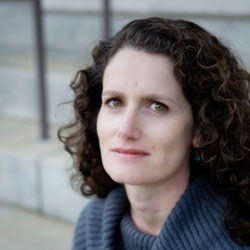I took a trip to Ukraine. It was June.
I waded in the fields, all full of dust
and pollen in the air. I searched, but those
I loved had disappeared below the ground,
deeper than decades of ants. I asked
about them everywhere, but grass and leaves
have been growing, bees swarming. So I lay down,
face to the ground, and said this incantation –
you can come out, it’s over. And the ground,
and moles and earthworms in it, shifted, shook,
kingdoms of ants came crawling, bees began
to fly from everywhere. I said come out,
I spoke directly to the ground and felt
the field grow vast and wild around my head.
Notes on the Poem
The poem "Scorched Maps", written in Polish by Tomasz Rózycki and translated into English by Mira Rosenthal, wastes no time in suggesting one direction, then moving disarmingly in another. Out of constraints of form and an accumulation of images with negative connotations, a surprising message of hope emerges. Many of our Poem of the Week selections use (and sometimes subvert) the sonnet form, a stalwart and evergreen poetic structure (that "arose in 13th-century Italy", as the 2014 Griffin Poetry Prize judges point out) with which much can be achieved. The 2014 Griffin Poetry Prize shortlisted collection Colonies is a sequence comprised entirely of sonnets, written in Polish by Rózycki and maintained in the fundamental 14-line format when translated into English by Rosenthal. How does the discipline imposed by the form, employed by the poet and honoured by the translator, inform the poem? Rosenthal's attentiveness to Rózycki's use of the sonnet is clear from her translator's introduction to the collection:"My task in translating the present work was to remember that sound drives sense, not the other way around. I put the musicality of the English before any strict idea of fidelity in an effort to write alongside the Polish, not from it. Instead of adding or altering ideas in order to replicate end rhyme, I played up the natural sonic texture of the English and used the strong iambic meter of the English sonnet as a way to impart the kind of incessant music that we find in the original Polish. Yet a translator's hands are inevitably bound by the ties of meaning. Ró?ycki breaks with the form often enough, expanding the line in Polish, that it was necessary at times to depart from the pentameter line in English in order to convey the breadth of ideas. But my overall intent was to use form as a means to resist simply following meaning, in order to strike real poetry in English."While applying this focus to the work and balancing that with striving "to strike real poetry in English" - which she does beautifully - Rosenthal takes us as readers from a macroscopic view of things ... "I took a trip to Ukraine. It was June." swiftly and crisply (remember, there are only 14 lines with which to get it all in) to a microscopic view, populated by ants, bees, moles, worms, grasses and leaves, all viewed at ground level. The person taking the trip is on a sad journey ... "I searched, but those I loved had disappeared below the ground" but before the sonnet's 14 lines are used up, we're swept back up to this illuminating conclusion: "I spoke directly to the ground and felt the field grow vast and wild around my head." In short and exhilarating order, we and the person on this wistful sojourn have gone from contemplations of loss and decay to acceptance and signs of new life. The life that continues and thrives after death swirls "vast and wild" around us.
